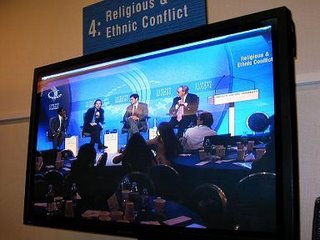CGI Workshop on Darfur
Trading in on your celebrity or cashing in on your business influence is ethically neutral in and of itself. Most people would probably see it as "bad" if someone uses their influence for matters of greed or pure self-interest. What do most of us see as the right thing to do? A person might use their corporate influence in a way that sheer profiteers would consider crazy because there's no pocket value in it. A celebrity might "throw his weight around" in the service of human rights, and he might be inspiring and followed - or he might be called a "Hollywood busybody" by careless naysayers. In a discussion today at the Clinton Global Initiative meeting, it was clear that two particular men have cast aside the possibility of worrying too much about any of those public perceptions while they are in the service of their fellow men and women's human rights. They are hoping that other world citizens will join them.

As a rule, pure altruism isn't what gets people motivated - it's their pockets. One witness to genocide's consequences is actor Don Cheadle, who starred in Hotel Rwanda a number of years ago. He experienced a personal transformation after talking with victims of genocide, and has been an activist since. He would like to think that we're moving beyond the "Oh my God" when we hear about atrocities in Darfur and that we're moving toward acting for the real alleviation of suffering.
There are no customers or business prospects in Darfur today, so many in the business world ask Timberland's Jeffrey Swartz, "What are you doing in Darfur?" He reflected the personal truth that "sometimes you choose - and sometimes you're chosen." You can choose to be an illogically involved CEO or "Missing in Action" while people die. He made his choice firmly: "Mark me as illogical."
This question does not have easy answers: How do we avoid using tired and failed activism strategies? Mr. Swartz has thought a lot about the private sector and how he and other socially conscious businesspeople can put the pressure of the marketplace to work. He suggested that, together, we all can create sensible and successful solutions in Darfur and that it's not a notion borne of business sense, intellect, profit or gain - it's a visceral notion. He stated proudly that those suffering in Darfur could count on him to be "on their side."
John Pendergast works with the International Crisis group. In Sudan, Crisis Group suggests strategies for peace in Africa's largest country, riven by ethnic and religious divisions, and multiple conflicts, including in Darfur. Mr. Pendergast asked the question that so many have recently asked, including celebrities like Mira Sorvino, Archbishop Desmond Tutu, as well as George Clooney and Elie Wiesel who were in front of the the UN Security Council last week. "Why does nothing real seem to occur?" He says that bell-ringing for "anti-hypocrisy" is important to geting to a meaningful and effective solution to the societal atrocities in Darfur, and that it is the worst human rights disaster on the face of the earth today.
Following General Colin Powell's past speech to the UN on Darfur, there was hope that the 'sacred covenant' implicit within the international community and their oft-used slogan "never again" would be enough to spark real action and inertia. Unfortunately, there are politcial priorities that are constant obstacles to a meaningful solution and they can only be overcome by a "raise in temperature" through citizen action. Faith based communities and students are the ones primarily pushing for solutions on Darfur today. They have developed emotionally-inspired commitments to press for action. These "rag tag" groups want "never again" to be a statement that we truly mean and that we just don't say it, throw up our hands, and do nothing.
If the international community recognizes this as "genocide," the choice of "Do Nothing" or a "Non-consentual deployment of force" is a false choice. There are many other ways in the middle to address the human rights disaster. Violent counter-insurgency strategies with no international political costs to the government of Sudan is not going to change the Sudanese government's behavior. We, as a global community, need to impose that cost if we are to act as a moral people who show the people of the world that its leaders mean what they say.
Panel member agreed that what is needed is a continuation of a groundswell-building of information. Darfur is under-reported by media, barely in the news at all. CGI is one real-world soution.

For Mr. Cheadle, speaking at demonstrations and premieres is a way that he personally educates citizens about the Sudan crisis. Leaders, in general, respond to what they believe their constitiuency wants, and is the only thing that captures their attention from the usual special interest "gods" that they serve. To each and every citizen, Mr. Cheadle says that there will be no rally and no action if you do not take any personal steps. To him, it is disturbing to know that we're still sitting down and having to talk about what has been happening for so long. He looked into the eyes of those who had directly suffered. Rwandan citizens - human beings - pleaded with him to tell their story and he promised to do so. He commented that when you do that and you don't see the line moving, it's pretty frustrating. On the hopeful end, Mr. Cheadle feels that disparate groups are beginning to coalesce.
A political solution is the only thing that will wind up stopping the killing. Pressure must be put on the Sudanese government to put a stop to the violent counter insurgency strategies that are senselessly taking so many innocent lives.
Hope has been the tone throughout the CGI meeting. Combine that with common sense solutions from workshop meetings and funding commitments, and we may have hope for many new miracles - great and small.
A light note: One solution the working group suggested toward the session's end was to clone Don Cheadle!

